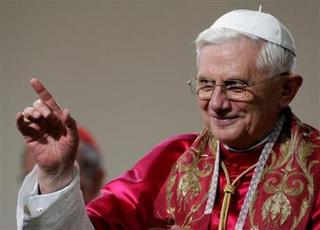
And he said to an ecumenical gathering of non-Cathoics:
"Dear Brothers and Sisters in Christ, our common Lord!"
"It is a pleasure for me to meet you, the representatives of other Churches and ecclesial Communities, during my visit to Germany. I greet you all most cordially! As a native of this country, I am quite aware of the painful situation which the rupture of unity in the profession of the faith has entailed for so many individuals and families. This was one of the reasons why, immediately following my election as Bishop of Rome, I declared, as the Successor of the Apostle Peter, my firm commitment to making the recovery of full and visible Christian unity a priority of my Pontificate.
"Among Christians, fraternity is not just a vague sentiment, nor is it a sign of indifference to truth. It is grounded in the supernatural reality of the one Baptism which makes us members of the one Body of Christ (cf. 1 Cor 12:13; Gal 3:28; Col 2:12). Together we confess that Jesus Christ is God and Lord; together we acknowledge him as the one mediator between God and man (cf. 1 Tim 2:5) and we emphasize that together we are members of his Body (cf. Unitatis Redintegratio, 22; Ut Unum Sint, 42).
"It is obvious that, in the end, this dialogue can develop only in a context of sincere and committed spirituality. We cannot “bring about” unity by our powers alone. We can only obtain unity as a gift of the Holy Spirit. Consequently, spiritual ecumenism – prayer, conversion and the sanctification of life – constitute the heart of the ecumenical movement (cf. Unitatis Redintegratio, 8; Ut Unum Sint, 15ff., 21, etc.). It could be said that the best form of ecumenism consists in living in accordance with the Gospel.
"I see good reason for optimism in the fact that today a kind of “network” of spiritual links is developing between Catholics and Christians from the different Churches and ecclesial Communities: each individual commits himself to prayer, to the examination of his own life, to the purification of memory, to the openness of charity. The father of spiritual ecumenism, Paul Couturier, spoke in this regard of an “invisible cloister” which unites within its walls those souls inflamed with love for Christ and his Church. I am convinced that if more and more people unite themselves to the Lord’s prayer “that all may be one” (Jn 17:21), then this prayer, made in the name of Jesus, will not go unheard (cf. Jn 14:13; 15:7, 16, etc.). With the help that comes from on high, we will also find practical solutions to the different questions which remain open, and in the end our desire for unity will come to fulfilment, whenever and however the Lord wills. I invite all of you to join me in following this path."

No comments:
Post a Comment